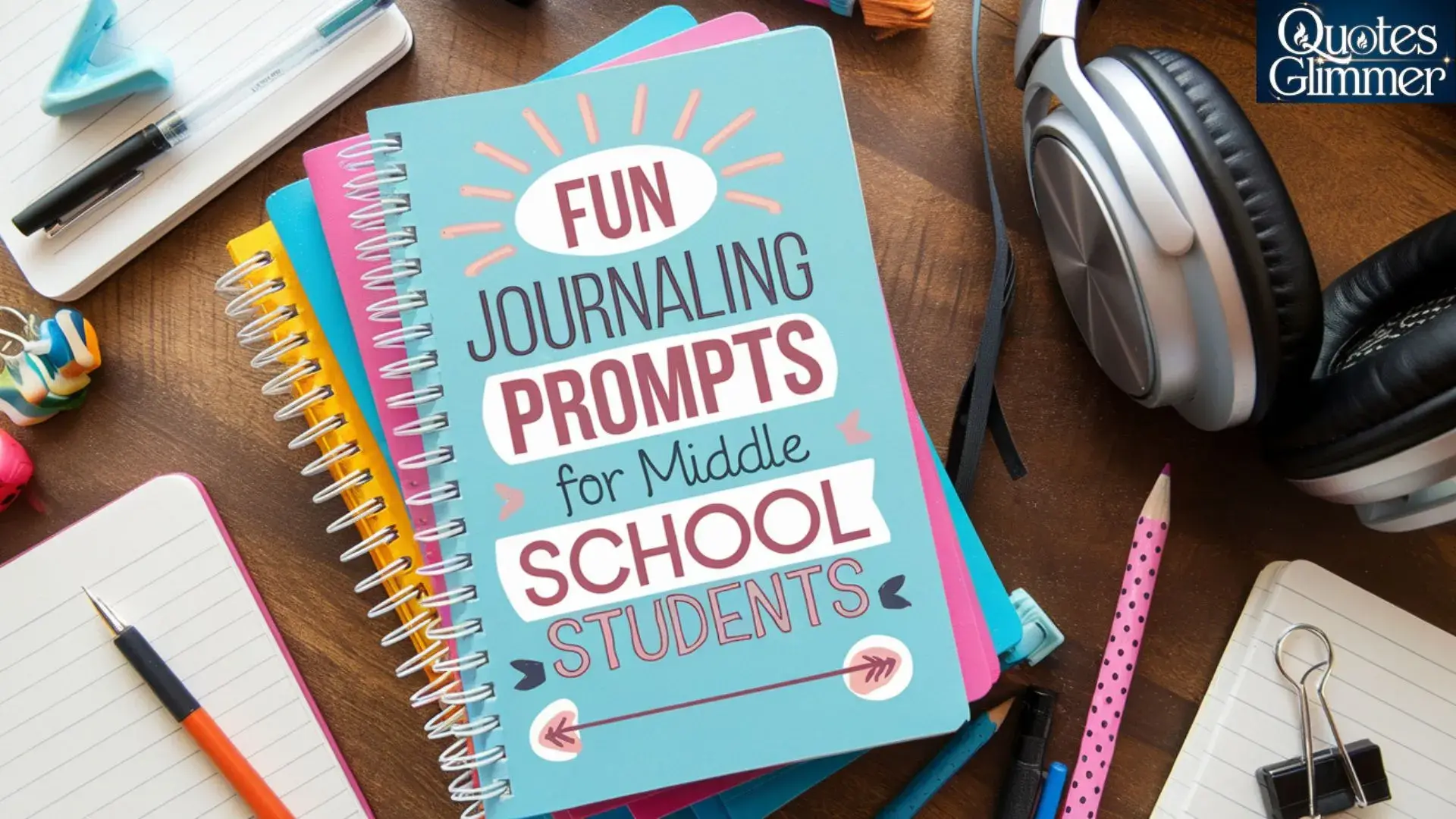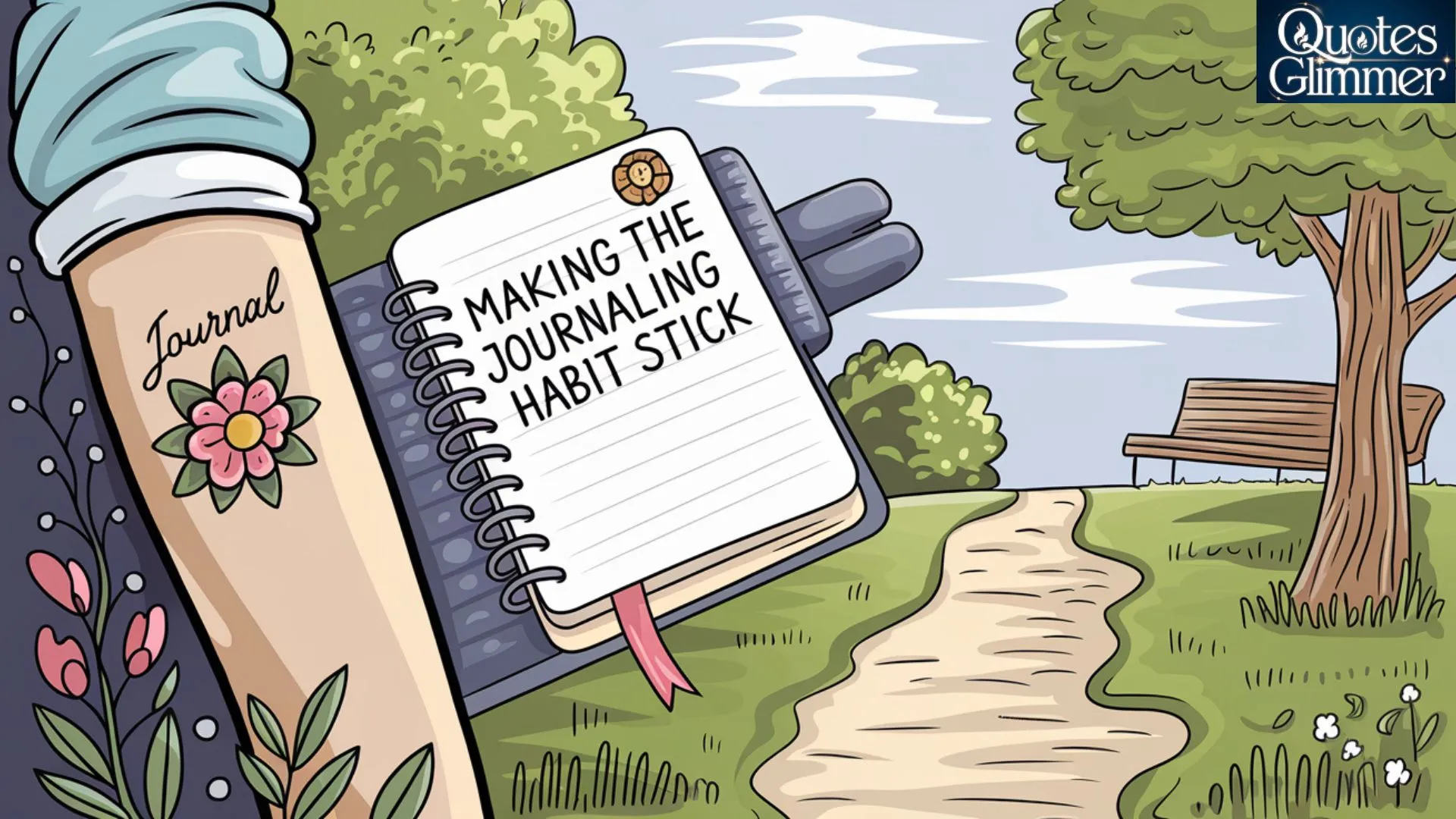Journaling is more than just putting pen to paper; it’s a powerful tool for self-expression, creativity, and personal growth. The beauty of journaling lies in its flexibility—it can be whatever you need it to be. Whether you’re aiming for mental clarity, stress relief, or just an enjoyable creative outlet, journaling can serve many purposes. To make this practice even more enjoyable, we’ve curated 50 of the best fun journaling prompts. These prompts cater to various age groups and interests, from adults to kids, couples, and middle schoolers.
Fun Journaling Prompts for General Use

These prompts are great for anyone looking to explore their thoughts and creativity. They’re fun, lighthearted, and designed to make journaling feel less like a chore and more like an adventure.
- Imagine you’ve just won a million dollars. What’s the first thing you’d buy, and why? Dreaming about a lottery win can reveal a lot about your priorities and desires. Whether it’s splurging on a luxury vacation, investing in your passions, or helping out friends and family, what you choose to do with that money says a lot about you.
- Describe your perfect day in detail. What would you do if you had a day all to yourself? From morning until night, how would you spend each moment? Would you spend it being productive or indulging in hobbies? This prompt helps you visualize what’s most important to you and can serve as inspiration for how to structure your days to bring you more joy.
- If you could have any superpower, what would it be and why? Everyone fantasizes about superpowers at some point. But which one would truly change your life for the better? Whether it’s flying, reading minds, or being able to teleport, this prompt gives you a chance to explore your hidden desires and consider how you’d use your newfound abilities.
These fun, lighthearted prompts are just the beginning of your journaling journey. Whether you’re writing for reflection, relaxation, or creative expression, these prompts will guide you into a deeper understanding of yourself.
Fun Journaling Prompts for Adults
Adults often juggle work, family, and personal life, leaving little time for reflection or creative expression. Journaling can serve as a mental break or a tool for personal growth. Here are some journaling prompts designed specifically for adults, offering both fun and introspective exercises.
- What are three things you’re grateful for today? Practicing gratitude daily can significantly improve your mood and mental health. By reflecting on even the smallest moments of joy—whether it’s a good conversation, a productive day, or simply the sunshine—you can shift your mindset from focusing on stress to appreciating the good things in life.
- What’s your favorite way to unwind and relax? Everyone needs a moment to recharge. Whether it’s reading, taking a long walk, or soaking in a hot bath, reflecting on what relaxes you can encourage you to prioritize self-care more often.
- List 10 things that make you happy. This prompt helps you focus on the things that bring joy to your life. It’s not about grand gestures but simple pleasures that brighten your day. This could be anything from drinking your favorite tea to spending time with loved ones. By keeping a list of these happy moments, you have a go-to source of positivity whenever you’re feeling low.
- What’s a skill or hobby you’ve always wanted to learn? This prompt allows you to explore your unfulfilled passions. Why haven’t you pursued them? What’s stopping you, and how can you take small steps to start? Whether it’s painting, learning a new language, or developing your cooking skills, this prompt invites you to reignite your curiosity.
- What was the most unexpected thing that’s happened to you this year? Life is full of surprises—some wonderful, some challenging. Reflecting on these unexpected moments can help you process change and navigate uncertainties. How did these surprises impact your life, and what did you learn from them?
Fun Journaling Prompts for Middle School Students

Middle school is a time of significant personal growth and discovery. Journaling can help students explore their identities, navigate emotions, and even cope with the stresses of school and social life. These prompts are fun, but they also provide middle schoolers with an outlet for self-expression and reflection.
- If you could be famous for one thing, what would it be? This prompt invites middle schoolers to think about what they’re passionate about and what kind of legacy they might want to leave behind. Whether it’s inventing a new gadget, becoming a world-class athlete, or making a significant scientific discovery, writing about fame helps kids explore their aspirations and values.
- Write about a time when you were really proud of yourself. This prompt encourages students to reflect on their accomplishments, no matter how big or small. Whether it was acing a test, overcoming a fear, or helping someone in need, recognizing personal achievements boosts self-esteem and helps build confidence.
- If you could change one rule at school, what would it be and why? Middle school students often feel constrained by rules and routines. This prompt gives them a voice to express what changes they’d like to see, whether it’s having more time for recess, being allowed to use cell phones, or making lunchtime longer. Writing about these changes can help them feel empowered and heard.
These prompts allow middle schoolers to think critically and creatively, fostering both academic and personal growth in a fun and engaging way.
The Benefits of Fun Journaling Prompts
Journaling offers numerous benefits beyond simply putting thoughts on paper. It can enhance creativity, improve mental clarity, and even provide a sense of stress relief. Below are some of the key benefits:
- Creativity Boost: Fun journaling prompts encourage free thinking and imagination, which can translate into more creativity in other areas of life, like problem-solving or artistic expression.
- Personal Growth: Reflecting on your thoughts and experiences helps you better understand yourself. This leads to greater self-awareness, emotional intelligence, and personal growth over time.
- Mental Clarity: When you journal, you organize your thoughts, making them clearer. This clarity helps you better understand your challenges, make decisions, and plan for the future.
- Improved Relationships: Journaling as a couple, or even writing letters to people in your life, can help you process emotions and communicate more effectively. Whether you’re reflecting on your relationship or simply expressing gratitude, journaling can deepen your connections with others.
Journaling is a versatile tool that benefits everyone, regardless of age or experience. Whether you’re writing to explore your inner thoughts, relieve stress, or simply have fun, these prompts offer a way to engage with yourself and the world around you in a meaningful, enjoyable way.
Practical Applications of Journaling
Beyond the fun and creative aspects of journaling, this practice has practical applications that can significantly improve various facets of life, from mental well-being to productivity and emotional intelligence. Here’s how journaling can be integrated into your daily routine to maximize its benefits.
1. Journaling for Mental Health

One of the most powerful uses of journaling is as a tool for mental health. Writing down thoughts and feelings offers a space to process emotions, identify patterns, and gain perspective. This can help people with anxiety, depression, or stress to manage their mental state more effectively. For example:
- Stress Management: Journaling about daily stressors can help you understand what’s causing your stress, enabling you to develop coping strategies.
- Emotional Processing: Writing down your emotions gives you the space to confront them, making it easier to address difficult feelings like anger, sadness, or frustration.
- Cognitive Behavioral Therapy (CBT) Exercises: Journaling can be paired with therapeutic techniques like CBT, where individuals track negative thought patterns and reframe them.
For adults, especially those juggling work and personal life, setting aside just 10 minutes a day to jot down feelings can alleviate tension and improve clarity.
2. Journaling for Productivity
Many highly successful people swear by journaling as a productivity tool. Here’s how it can help:
- Setting Goals: Regularly writing down goals, breaking them into smaller tasks, and reflecting on progress keeps you accountable and motivated. A journal acts as a roadmap for your aspirations, helping you stay on track.
- Problem Solving: Journaling offers a structured way to tackle problems. By writing out a challenge, you can brainstorm solutions, weigh pros and cons, and reflect on possible outcomes.
- Time Management: Reflecting on how you spend your day, what went well, and where time was wasted can improve your time management skills. Many people use journaling to plan their day, week, or even month ahead.
3. Journaling for Self-Improvement

Self-improvement doesn’t have to be an overwhelming task. Journaling breaks down this process into manageable steps. Whether you’re working on a specific skill or striving to build better habits, using your journal as a self-improvement tool allows for constant reflection and growth. Examples include:
- Habit Tracking: Journals are perfect for tracking progress on habits, whether it’s exercising, eating healthy, or meditating. Writing about the process each day helps reinforce positive behavior.
- Personal Reflection: Writing about your experiences and reactions to daily life can reveal areas for improvement, whether that’s becoming more patient, confident, or open-minded.
- Gratitude Journaling: Writing down things you’re thankful for on a regular basis fosters a positive mindset. It encourages you to focus on the good, rather than dwelling on the negative.
These practical applications make journaling a flexible, personalized tool that adapts to your needs, helping you manage mental health, productivity, and self-growth all in one place.
Overcoming Common Challenges When Starting Journaling
Despite its benefits, starting a journaling practice can feel daunting for some people. Whether it’s finding the time, knowing what to write about, or feeling unsure if it’s “worth it,” there are ways to overcome these common challenges.
1. “I Don’t Have Enough Time”
One of the most common reasons people avoid journaling is the belief that they simply don’t have time. The key to overcoming this challenge is to start small. You don’t need to spend an hour each day writing—just five minutes can make a difference. You could:
- Write in short bursts, using prompts like “What’s on my mind today?” or “How am I feeling right now?”
- Integrate journaling into an existing routine, like during your morning coffee or before bed.
- Keep it simple! Journaling doesn’t have to be lengthy or complicated. Sometimes a single sentence capturing a thought or emotion can be incredibly powerful.
2. “I Don’t Know What to Write About”
Writer’s block is a real obstacle for many, especially when it comes to journaling. The good news is that there’s no wrong way to journal. You don’t need to follow a set structure or worry about writing “well.” The goal is to express yourself freely. Here’s how to get past this block:
- Use Prompts: This is where fun journaling prompts, like the ones mentioned earlier, can help. They give you a starting point and make the process more enjoyable.
- Stream of Consciousness Writing: Simply write whatever comes to mind, even if it seems random or disconnected. This method can help unlock your thoughts and get the words flowing.
- Ask Yourself Questions: If you’re unsure where to start, ask yourself simple questions like “What did I enjoy today?” or “What was challenging about my day?”
3. “I’m Not Sure If It’s Helping”
Some people give up on journaling because they don’t see immediate benefits. However, journaling is often about the long-term process. It’s okay if you don’t feel an immediate sense of relief or insight from every session. Here’s how to stay motivated:
- Set Clear Intentions: Define what you want to achieve with your journaling practice. Whether it’s emotional clarity, stress relief, or creative expression, having a clear intention will help you measure its impact over time.
- Be Consistent: The more regularly you journal, the more you’ll start to see its effects. Like any habit, the benefits compound over time.
- Review Past Entries: Reflecting on past entries can show you how much you’ve grown, even if you don’t notice it day-to-day. Seeing your own progress in writing can provide motivation to keep going.
With these tips, journaling can feel more approachable and rewarding. Consistency and patience are key when starting a journaling practice, but the rewards are well worth the effort.
Making the Journaling Habit Stick

To truly benefit from journaling, it helps to make it a regular part of your life. Here are some strategies to help ensure that journaling becomes a lasting habit:
1. Create a Journaling Ritual
Habits are easier to form when they’re linked to other activities. Turn journaling into a ritual by connecting it to another daily habit. For example:
- Journal every morning with your first cup of coffee.
- Write a few thoughts down at the end of the workday to decompress.
- Use it as a wind-down activity before bed.
Creating a specific time and place for journaling helps signal to your brain that it’s time to write.
2. Set Achievable Goals
Start with small, manageable goals. Rather than committing to an hour of journaling every day, aim for five minutes, or set a goal to write just a few sentences. As you get used to the practice, you can gradually increase your time and depth. Achieving small goals helps build confidence and momentum.
3. Use a Journal You Love
Investing in a journal that you enjoy using can make a big difference in maintaining the habit. Whether it’s a leather-bound notebook, a digital journaling app, or a fun, colorful notebook, choose something that motivates you to open it up and start writing. The physical act of writing with a pen or pencil can also be more engaging for some people, while others may prefer typing.
4. Keep It Fun and Low Pressure
Remember that journaling is supposed to be enjoyable, not a chore. Allow yourself to have fun with it, using doodles, sketches, stickers, or other creative elements to enhance your entries. And most importantly, don’t pressure yourself to be perfect. Journaling is for you, so it doesn’t matter if your handwriting is messy or your thoughts seem scattered. It’s the act of writing and reflecting that counts.
5. Incorporate Accountability
If you struggle with sticking to new habits, try creating some accountability around journaling. You could:
- Partner with a friend and share journaling prompts with each other.
- Set reminders on your phone or calendar.
- Join a journaling community or group for inspiration and support.
By keeping yourself accountable, you’re more likely to stay consistent with the practice.
Journaling Tips for Different Age Groups

Got it! I’ll use alternatives like “older people” or specific age groups moving forward. Let me know if you’d like to adjust anything else.
1. For Kids
Journaling for kids should be playful and imaginative. The key is to tap into their natural curiosity and creativity. Here are some tips:
- Incorporate Drawing: Kids love to draw, so encourage them to combine writing with illustrations. They can write a story and then draw a picture to go along with it.
- Use Fun Prompts: Kids enjoy prompts that let them explore fantasy scenarios, like “What would you do if you found a magic lamp with a genie inside?” or “What’s your superhero name, and what are your powers?”
- Make it Interactive: Consider using stickers, stamps, or different colored pens to keep things visually interesting. This adds an element of fun that makes journaling more exciting.
2. For Teens
Teenagers often use journaling as an emotional outlet and a way to explore their identity. Here’s how to encourage them:
- Offer Prompts That Address Emotions: Teens can benefit from prompts that help them process their feelings. Questions like “What’s something that has been stressing you out lately?” or “Write about a time when you felt misunderstood” are good starting points.
- Encourage Reflection on Goals: As teens start thinking more about the future, they can use journaling to set goals and reflect on their dreams and aspirations.
- Introduce Gratitude Journaling: Gratitude journaling can help teens focus on the positive aspects of their lives, fostering resilience and a healthy mindset.
3. For Adults
Adults often use journaling as a tool for self-improvement, productivity, and stress relief. Here’s how to make it work for this age group:
- Focus on Reflection: Adults can benefit from deeper reflective prompts that encourage introspection. Writing about challenges, successes, and growth opportunities can be a productive form of self-assessment.
- Incorporate Mindfulness: Mindful journaling, where you focus on being present and observing your thoughts without judgment, can be especially beneficial for adults looking to manage stress or anxiety.
4. older people
Journaling for older people, particularly those over 70, is an excellent way to reflect on life experiences and stay mentally sharp. Here are some ideas:
- Write Memoirs: Older individuals can journal about their life stories, capturing key memories and family history. This serves as a meaningful way to pass down experiences and wisdom to younger generations.
- Focus on Gratitude: Gratitude journaling can be particularly beneficial for older people, helping them stay positive by focusing on the joys and blessings they’ve experienced throughout life.
- Use Prompts About Legacy: Prompts such as “What advice would you give your younger self?” or “What do you want to be remembered for?” offer older people a chance to reflect on their legacy and share valuable insights.
Must Read Instagram Bio for Boys Attitude, VIP, Stylish Bio
Conclusion
Journaling is a wonderful way to explore your thoughts, dreams, and emotions. Whether you’re an adult looking for reflection, a kid exploring your imagination, or a couple hoping to connect on a deeper level, these fun journaling prompts can provide a spark. They encourage creativity and help you process your thoughts, offering numerous benefits like increased mental clarity and stress relief.
Journaling is a personal journey, and it’s up to you how you choose to use these prompts. The goal is to have fun, reflect, and discover new things about yourself along the way.
So grab your journal, pick a prompt, and start writing! Your journal is your canvas—let your thoughts and creativity flow freely across the pages.
Learn About Quotes Glimmer

“Explore our collection of inspiring quotes that uplift and motivate. From timeless wisdom to modern insights, find the perfect words to resonate with your thoughts and feelings. Whether you’re seeking inspiration for yourself or sharing with others, our quotes will add depth and meaning to your everyday life.”







